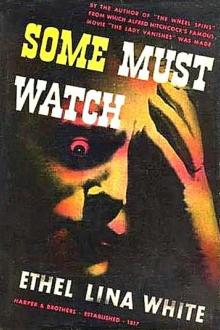Some Must Watch, Ethel Lina White [crime books to read txt] 📗

- Author: Ethel Lina White
- Performer: -
Book online «Some Must Watch, Ethel Lina White [crime books to read txt] 📗». Author Ethel Lina White
She could see her quarry—a small and rather attractive rodent—frisking
in the distance, with the assurance of an old resident.
“Where’s its hole?” she whispered.
“In that corner,” panted Mrs. Oates. “Oates did say as how he’d stop it
up.”
Helen was driving the mouse homewards when she started at’ the sound of
footsteps on the back-stairs.
“Who’s that?” she cried.
“Not him,” laughed Mrs. Oates. “When he comes you’ll not hear him on the
way. He’ll creep. That sounds like Mr. Rice.”
As she spoke the door was pushed open, and Stephen Rice carrying a
suitcase—entered the kitchen. He stared at the sight of the demure Miss
Capel on her knees, with her hair falling in a mane across her eyes.
“What’s this?” he asked. “Red Indians, or a crawling party? Count me
in.”
“I’m chasing a mouse,” explained Helen.
“Great sport. I’ll help.”
“No, I don’t want to catch it.” Helen rose and placed the bar on the
table. “I think he’s gone now.”
Stephen sat down and looked around him.
“I always feel at home, here,” he said. “It’s the one room I like in
this horrible house. Mrs. Oates and I hold our prayer-meetings here.”
“Where’s your dog?” asked Helen.
“In my room. Miss Warren did not come to tea, unfortunately. So the
row’s postponed.” “Why d’you have one at all?” asked Helen. “You’re
leaving tomorrow. I expect Miss Warren would prefer not to know.”
“No.” Stephen stuck out his prominent chin. “I’d rather come out in the
open. Noble of me, when I know the heroic Newton will enlighten her
darkness in any case.”
“He wouldn’t tell?” cried Helen incredulously.
“Wouldn’t he? To be frank, Otto was not a blazing success. The poor lad
is not used to afternoon tea. Like his master, he’s happier in the
kitchen.”
“But Mrs. Newton must have fallen for him,” insisted Helen, who argued
along the familiar lines or “love me, love my dog.”.
“If she did, she controlled her passion.” Stephen opened his empty
suitcase and turned to Mrs. Oates. “Where are the empties?” he asked. “I
thought I’d lift them now, and lug them over to the Bull tonight, to
save that poor delicate husband of yours.”
“And I suppose you want to say ‘Goodbye’ to your young lady there?”
Mrs. Oates winked at Helen, who—enlightened by her previous
gossip—understood the allusion to to daughter of the licensee of the
Bull. Apparently, this young lady was not only the patron-saint of the
bar, but the magnet that reassembled the sparse male population of the
district.
Mrs. Oates took advantage of her privileged position to ask another more
personal question.
“And what will your other lady say, if you spend your last night away?”
“My other—what?” demanded Stephen.
“Mrs. Newton.”
“Mrs. Newton Warren is a respectable married lady. She will naturally
pass the evening in the company of her lawful husband, working out
mathematical problems…”
“Did you have a good tea?”
Helen did not hear the question, for she suddenly glimpsed an exciting
possibility.
“Did Miss Warren have her tea up in the bedroom?” she asked.
“I suppose so,” replied Stephen. “Then she’s been up there for ages. I
wonder if I might, offer to relieve her?”
“If you do,” advised Stephen, “see that she’s supplied with cushions.
Unless, of course, you’re expert in dodging.”
“But does she always throw things at people?” asked Helen
incredulously.
“It’s the only way she knows of expressing her temperament.”
“Well, it doesn’t matter. I think she sounds so alive for an old woman.
I admire that.”
“You’ll be disillusioned,” prophesied Stephen. “She’s a vile-tempered
old cuss, with horrible manners. When I was presented to Her Majesty,
she was eating an orange, and she spat out all the pips—to impress me.”
He broke off to laugh at a sudden recollection.
“All the same,” he said, “I’d love to have seen her chuck the basin at
that pie-faced nurse.”
“But, surely, that was an accident. She couldn’t have known she was
going to hit her.”
Mrs. Oates looked up, with streaming eyes, from her task of peeling
onions.
“Oh, no, miss,” she said. “Lady Warren wouldn’t miss. When she was
younger, she spent all her time tramping over the fields, shooting
rabbits and birds. They said she went to bed with her gun.”
“Then she’s been here a long time?” asked Helen.
She believed that her curiosity was about to be given a real meal, for
Mrs. Oates’ manner hinted at gossip.
Stephen rolled a cigarette—the cat purred on the rug the mouse washed
his face, in the safety of his hole. Inside was firelight and
tranquillity—outside, the rising storm.
A gust of wind smashed against the corner of the house, and spattered
the unbarred shutter, before the passage window, with the remnants of
its original fury. Slowly, as though pushed open by invisible fingers,
the casement swung outwards over the garden. The house was open to the
night.
It looked in, through the gap, and down the darkness of the passage. Its
far end stretched away into shadows. Round the bend, was the warren of
the offices—a honeycomb of cells, where a man could hide.
Inside the kitchen, Mrs. Oates electrified her audience.
“They do say,” she said dramatically, “as old Lady Warren shot her
husband.”
“No,” gasped Stephen and Helen together.
“Yes,” declared Mrs. Oates. “It’s an old wives’ tale now, but my mother
told me all about it. Old Sir Roger was just such a one as the
Professor, quiet, and always shut up with his books. He made a lot of
money with some invention.. He built the Summit, so as to have no
neighbors. And Lady Warren couldn’t abide It. She was always jawing him
about it, and they had one awful quarrel, in his study. She was
overheard to threaten to shoot him for vermin. A few minutes later he
was found shot dead, with her rookrifle.
“Looks pretty bad,” murmured Stephen.
“Yes, everyone thought she’d stand in the Dock,” agreed Mrs. Oates.
“There was some nasty questions asked at the Inquest. She said as how it
was an accident, and her clever lawyer got her off… But there was
so much feeling about it that she went abroad—though she’d have gone,
anyhow, as she fair hated the house.”
“Was it shut up afterwards?” asked Helen.
“No, the Professor left Oxford, and came here, and he’s been just the
same as his father before him—always staying in, and never going out.
Old Lady Warren only came back when she said she was ill.”
“What’s the matter with her?” asked Helen.
Mrs. Oates pursed up her lips and shook her head.
“Temper,” she said firmly.
“Oh, but Mrs. Oates, she must be ill, to have a nurse, and for the
doctor to keep her in bed.” “He reckons she’s less trouble there. And
she reckons she can give more trouble there. It’s a fair game for her to
drive the nurses away, so as to get fresh ones in to bully.”
“But Miss Warren told me that the Professor was anxious about her
heart,” persisted Helen. “Ah, but a man don’t forget the mother, that
bore him,” declared Mrs. Oates, lapsing into sentiment.
“But she’s only his step-mother,” objected Stephen. “She has no
children. Still, she must be expected to croakbe cause the vultures are
gathering. Simone told methatthe old girl has made a Will, leaving her
money to charities. She has a nasty perverted taste, and, apparently,
likes Newton. Anyway, she makes him an allowance, which will cease at
her death. That’s why he’s down here.”
“His pa sent for him,” explained Mrs. Oates.
Helen thought of the Professor’s glacial eye and Miss Warren’s detached
manner. It was impossible to believe that they were swayed by financial
considerations.
“Hullo,” said Stephen suddenly, as he swung himself up on the table.
“What’s this?”
He drew from under him a wooden bar, which Helen took from him, rather
guiltily.
“Sorry,” she said. “It belongs to the shutter in the pas sage. I’m glad
you reminded me of it. I’ll try and fix the window.”
After what she had heard, she felt eager to finish the job, and get
upstairs, to the blue room, as quickly as possible. She made a makeshift
fastening with some string and a peg, and then hurried back to the
kitchen.
To her surprise, Stephen was peeling onions with Mrs. Oates.
“She always makes me work,” he complained. “It’s her way of explaining a
man in the kitchen, when Oates comes home… I say, isn’t he very
late? I bet you a fiver he’s run off with the pretty new nurse.”
Mrs. Oates snorted.
“If she’s like the last, she’d have to hold his nose, to get him to kiss
her… Are you really going to sit with Lady Warren, miss?”
“I am going to ask if I may,” replied Helen.
“Then, take my warning, and be on the watch out against her. It’s my
belief she’s not as helpless as they make out, by a long way. I’m sure
she can walk, same as me. She’s got something up her sleeve. Besides,
have you heard her voice, when she forgets?” Helen suddenly remembered
the bass bellow from the sick room. Here was a situation choked with
mystery and drama. In her eagerness to be in the thick of it she almost
ran to the door.
“I’ve tied up the window,” she said. “Now, we’re safely locked up, for
the night.”
THE BLUE ROOM
As Helen mounted the stairs to the blue room, she felt an odd stir of
expectancy. It took her back to childish days, when she neglected her
toys in favor of an invisible companion—Mr. Poke.
Although she played by herself for hours, in a corner of the communal
sitting room, it was plain to her parents, that she was not indulging in
a solitary game. She did everything with a partner.
And at twilight, when the firelight sent tall shadows flickering on the
walls, she carried on an interminable conversation with her hero.
At first, her mother disliked the uncanny element in the society
affected by her small daughter; but when she realized that Helen had
discovered the best and cheapest of playfellows—imagination—she
accepted the wonderful Mr. Poke and used to ask questions about his
prowess, to which there was no limit.
The staircase was lit by a pendant globe, which swung from a beam which
spanned the central well. The first floor was between this light and the
illumination from the hall, so that the landing was rather dark. Facing
the fligh of stairs, was an enormous ten-foot mirror, framed in
tarnished gilt carving, and supported by a marble console table.
As Helen approached it, her reflection came to meet her, so that a small
white face rose up from the dim depths of the glass, like a corpse
emerging from deep lake-water, on the seventh day.
The thrill which ran through her veins, in response, seemed to her, an
omen. Miss Warren came to the door, in answer to her knock. Her pale
face looked dragged and devitalized after hours of imprisonment with her
step-mother.
“Has the new nurse come?” she asked.
“No.” Helen was aggressively cheerful. “And we don’t expect her for
hours and hours. Mrs. Oates says the rain has made the hills difficult
for the car.”
“Quite,” agreed Miss Warren wearily. “Please let





Comments (0)